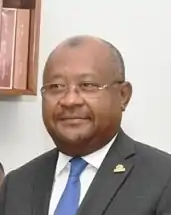Hamada Madi
Hamada Madi, widely known as "Boléro", is a Comorian politician, former Prime Minister and interim President. He is Secretary General of the Indian Ocean Commission.[1]
Hamada Madi | |
|---|---|
 | |
| Secretary General of the Indian Ocean Commission | |
| Assumed office 13 July 2016 | |
| President of the Comoros | |
| In office 21 January 2002 – 26 May 2002 | |
| Preceded by | Azali Assoumani |
| Succeeded by | Azali Assoumani |
| Prime Minister of the Comoros | |
| In office 29 November 2000 – 15 April 2002 | |
| Preceded by | Bianrifi Tarmidi |
| Succeeded by | Position abolished |
| Personal details | |
| Born | 1965 (age 57–58) Mohéli, Comoros |
Biography
Born on the island of Mohéli in 1965, he gained a degree in constitutional law in Ukraine and worked as a political adviser in Comoros, becoming secretary general of the Comoros Republican Party.
Before being appointed Prime Minister on 29 November 2000, he served as Secretary General for Defense in the Presidency and played a leading role in peace negotiations with Anjouan, leading to the Fomboni Accords. In January 2002, it was agreed, despite some opposition, that he would replace Colonel Azali Assoumani as interim head of state[2] and oversee the Transitional Government of National Unity in the run-up to the legislative and presidential elections. Due to his Mohélian origins, he was ineligible to run for the union presidency in 2002, when the first four-year term was reserved for a Grande Comorian. After the return of Azali to the presidency in May 2002, Hamada Madi was kept on as special advisor without portfolio with Union cabinet status.
After waiting several months Bolero got the permission from the Presidency in April 2007 to leave the country.
In 2016 Modi became Secretary General of the Indian Ocean Commission.[3]
References
- "À Propos". Commission de l'Océan Indien (in French). Retrieved 28 January 2019.
- "Comoros". worldstatesmen.org. Retrieved 30 October 2010.
- Caslin, Olivier (15 July 2016). "Hamada Madi Boléro : « Les pays de l'Océan indien doivent s'impliquer davantage »". Jeune Afrique (in French). Retrieved 28 January 2019.